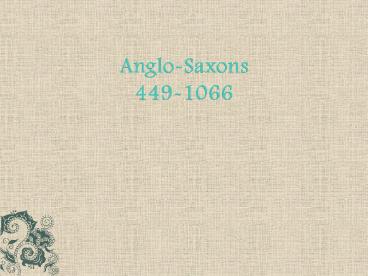Anglo-Saxons 449-1066 - PowerPoint PPT Presentation
1 / 18
Title:
Anglo-Saxons 449-1066
Description:
Great Britain was invaded by Angle and Saxon s Romans occupied Great Britain but evacuated troops due to troubles at home Loss of this protection made Great Britain ... – PowerPoint PPT presentation
Number of Views:271
Avg rating:3.0/5.0
Title: Anglo-Saxons 449-1066
1
Anglo-Saxons 449-1066
2
Whats Going On?
- Great Britain was invaded by Angle and Saxons
- Romans occupied Great Britain but evacuated
troops due to troubles at home - Loss of this protection made Great Britain
vulnerable - They had a strong warrior culture
- They occupied the island for 6 centuries
- They were originally divided into clans and later
unified by King Alfred
3
What Developed
- Great Britain was known for their warrior-king
and his close-knit group of followers - Great Britain finally defended itself from the
Danes (due to King Alfred) - This helped unify the Angles and Saxons
Anglo-Saxons - Christianity began to spread during this time
4
Important Date to Know
- 1066-The Norman Invasion/Battle of Hastings
- William of Normandy (William the Conqueror)
crosses the English Channel - William defeats Harold and the Anglo-Saxon army
- French replaces English as the language of the
ruling class
5
Literature of the Times
- Anglo-Saxons introduced a Germanic ethos (spirit
of a culture, what they value) - Celebrated the warrior and his exploits
- Based primarily on oral poetry- recited stories
and magic - Used alliteration heavily
- Spoke in Old English
6
Culture
- Food and Drink
- Oats, barley, wheat etc were popular for pottage
and beers - Wine was for the wealthy
- Peas and beans
- Vegetables and herbs
- Meat used the whole animal
- Milk was used for mainly butter and cheese
- Main meal was lunch
- Gathered wood in summer
- Used stoves
- Boiling, stewing, grilling, and roasting were
most common
7
Customs
- Hard for kings to create new laws, most only
upheld current laws - Kinship- family members were obliged to seek
revenge on murdered family members - No juries, those being tried were responsible for
gathering their own defense - Women had more rights now then in later time
periods
8
Customs Continued.
- When burying the dead, bodies were either put on
a ship or buried beneath a mound
9
Whats an epic?
- Long narrative poem about a quest, told in
formal, elevated language - Larger-than-life hero who embodies the values of
a particular culture - Incredible plot involving large-scale events
- Mix of myth, legend, and history that often
includes gods and goddesses as characters
10
Why is it Important?
- Epics represent a cultures history, traditions,
and values - Every culture has a story and wants everyone to
know why their culture is great - Epics help humans bridge the gap between reality
and divine (explain natural occurrences, etc)
11
First page of Beowulf
12
Beowulf
- The longest epic poem written in Old English
- Written after fall of Roman Empire
- The original manuscript of Beowulf dates back to
1000, however the poem is much older, dating back
to 750. - Geographical descriptions and Christian elements,
its assumed the writer may have been an
Northumbria Monk (added Christian elements
because fiction was not true, therefore a lie,
which is a sin. They could get away with fiction
if it contained Christian elements). - Does not take place in England
13
Summary
- Englands oldest surviving epic
- Tells the story of Beowulf who comes to the aid
of the Danes to defeat Grendel, who has been
tormenting the Danes for 12 years. - He fights Grendels mother and returns to
Geatland (his home) and becomes the ruler - Later, he faces one last threat, a dragonhis
last battle?!
14
Setting
- Denmark---A loooooong time ago
- This is where Beowulf goes to help Hrothgar and
the Danes - Herot- the Mead Hall
- Lake- swampy lake area, where Grendel and his
mother live (yes, he lives with his mom!) - Sweden (where Beowulf is from)
- Geatland-the town where Beowulf is from
- Returns here and becomes ruler/leaderfights
dragon here - DanelandDenmark (Danes)
- GeatlandSweden (Geats)
15
Themes
- Central Idea in a work of literature
- Possible themes to watch out for
- Importance of established identity
- Heroic Codes vs. other value systems
- Difference between a good warrior and a good king
16
Motifs
- Reoccurring items, structures, and/or literary
devices that help to inform the reader of the
theme - Possible motifs
- Monsters
- Mead Hall
17
Symbols
- Person, place, thing, or event that stands for
itself and for something beyond itself (ex-dove
is a symbol for peace) - Possible symbols
- Golden Torque (collar or necklace)
- The Banquet
18
Vocabulary
- Epic Hero- has superhuman qualities. Either of
noble birth or supernatural beings - Alliteration- repetition of consonant sounds
- Kenning- A metaphorical phrase or compound word
used to name a person, place, thing, or even
indirectly. - Scop (pronounced shop)-an Anglo-Saxon poet who
told his tales through song/chants - Wyrd (pronounced weird)-the Anglo-Saxon word for
fate - Page 21 Vocabulary 6 words-define in your notes
and use in a sentence (a different sentence than
the one used in the book)

